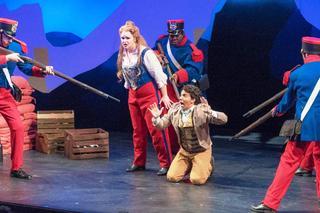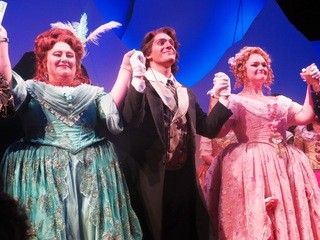|
Back
When Marie Comes Marching Home Again, Salut! Salut! New York
Saratoga Springs (Opera House)
06/29/2019 - & July 1, 7, 13, 2019
Gaetano Donizetti: La Fille du régiment
Keely Futterer (Marie), Santiago Ballerini (Tonio), Alex Soare (Sulpice), Whitney Robinson (The Marquise of Berkenfeld), Nicholas Martorano (Hortensius), Brandon Bell (Corporal), Zachary Barba/Zachary Morris (Peasant), Anny DeGange (The Duchess of Krakenthorp)
Saratoga Springs and Saratoga Opera Orchestra and Chorus, Andrew Bisantz (Conductor)
Lawrence Edelson (Artistic and General Director Saratoga Opera Festival, Director and Choreographer), Cameron Anderson (Scenic Designer), Kathleen Trott (Costume Designer)

K. Futterer & S. Ballerini with Saratoga Chorus members
(© Gary David Gold)
“I only wish that I could have composed Donizetti’s operas.”
Felix Mendelssohn, reportedly commenting on La Fille du régiment
Mendelssohn could no more have written Donizetti’s comic opera than Emily Dickinson could have written The 120 Days of Sodom. Donizetti’s genius was his alone.
On the other hand, even as farce, not even Verdi could have composed the trio near the beginning of Act II. When the aristocratic Marquise of Berkenfield starts to teach her hoyden niece, Maria, a vapid 18th Century aria, Maria sings it off-key–and then inserts, with her friend, Sulpice, a few measures of their marching song, and soon the stage reverberates with limpid melodies, patriotism, friendship and coloratura joy.
The closest image I can think of is in Casablanca, where the German marching song is outplayed by La Marseillaise. That one brings tears, the Donizetti brings smiles and delight.
As did this opening night production from Opera Saratoga’s 2019 Summer Festival. The four operas this year are the symbols of diversity. The comedy of the Donizetti, the eternal dream-play of Hansel and Gretel, the world premiere of Ellen West, the tragedy of a poet, by Ricky Ian Gordon, and that rarest of Rimsky-Korsakov, Mozart and Salieri, which musically has one of the most dramatic climaxes imaginable.
Back, though to La Fille du régiment, a work so charming, likeable, farcical and songful that many productions make the mistake of turning it into a Laurel and Hardy vaudeville rather than a very clever story told by two experienced librettists.
Director Lawrence Edelson starts that way with a rolly-poly Marquis of Berkenfeld (played with amiable outlandishness by Whitney Robinson) entering near a battlefield, taking refuge under her protective valet (prancing in with the campiest abandon by Nicholas Martorano), and the troops marching and singing like a combination of Gilbert and Sullivan and a salute to Gay Pride Month.
Was it fitting for the libretto? Absolutely right. Perhaps some director would try put in an alternative serious moment or two at the start. But Mr. Edelson, augmented by dashing French bleu-blanc-rouge costumes, had no other choice. With a few exceptional “serious” solos by the eponymous heroine and her true love Tonio, this is an opera which is tightly bound in fun, vocal jesting, the usual revelations and a gorgeous finale.
(Unless, of course, one is a sourpuss who doesn’t appreciate the glory of war!)
Our lovers are less Romeo and Juliet than Beatrice and Benedict. Maria, the camp follower (called a “canteen girl” here, though the word “sutler” is more appropriate for the French vivandière) is more than feisty, and Keely Futterer plays her to the hilt. Mind you, Ms. Futterer has the dimensions of a Wagnerian diva more than the original tomboy which Natalie Dessay played at the Met several years ago. But Ms. Futterer’s coloratura is so astounding–ranging up and down the scale from beginning to end of the opera–that one soon forgets this.
That voice does have its limitations. Outside of impassioned arias like Il faut partir, Ms. Futterer lets this astonishing soprano carry her on and off the stage so much that one tends to agree with the Marquise: “You have too much coloratura”. Is it possible to add, if not more character, at least more color? The timbre was gorgeous, the nuances were minimal.
Tonio, next to Ms. Futterer, seemed rather diminutive. But this didn’t stop Argentinian Santiago Ballerini from the most lovely rich tenor voice–as well as the overdone slapstick during their Act I repartee. Usually, these scenes pit two rustics against each other. Here, physically, it was the grand diva against the nervous Tyrolean bumpkin for another un-Donizetti layer of humor.
When Mr. Ballerini sung, though, physical levels gave way to transcendent spaciousness. In fact, the phrasing, the breaths, the legatos of Pour me rapprocher de Marie deserved the grandest applause from the Saratoga Opera audience.
Instead, the predictable raucous plaudits were given to A mes amis, with its eight or nine classic high C’s within a minute. Now... Mr. Ballerini is a fine mortal singer. Mr. Pavarotti was a god. And comparisons are oderous–and essential. Luciano’s aria was not a feat of gymnastics: whatever he did was natural, easy, happy, almost relaxing (and thus the miracle). Mr. Ballerini had no problem with the high C’s, but they came from a trapeze acrobat, they came to astonish (which they did), not to bring us closer to Olympus.
Give it time.

W. Robinson, N. Martorano, K. Futterer (© Samuel A .Dog)
The loveliest character here is Sulpice, and Alex Soare played and sung it with avuncular charm. (Though we know, if he had his druthers, Mr. Soare would want Marie for himself.)
Easily the most charming moment of the opera seemed like pure plagiarism, where in Act II, Sulpice, Marie and Tonio come together, face the stage and sing the rip-roaring cavatina Tous les trois réunis. I dare not accuse Mr. Edelson of stealing this moment, but the joy reflected almost literally the trio of Gene Kelly, Donald O’Connor and Debby Reynolds in Singin’ in the Rain.
By the end here, with the principals, the supernumeraries and the Saratoga Chorus men’s silly but sensational voicing for Salut à la France, one realized just what a resplendent opening Saratoga Opera had this year. The other operas will have their dreams, passions and legends, but Mr. Edelson and conductor Andrew Bisantz offered, on his balmy evening, two hours of unrestrained vocal and physical treasures.
Harry Rolnick
|